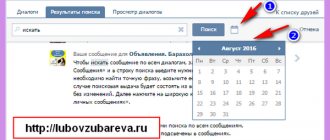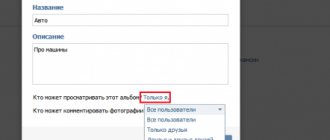The social network Vkontakte is one of the most important hobbies of modern Russian youth. After all, here you can not only communicate with friends, but also watch videos, listen to music, comment on photos, and share funny pictures.
In the process of developing a social network, young people have formed their own virtual slang, which, one way or another, denotes some aspects of communication over the network. Thus, one of the most common slang among young people is “LKF”, which baffles most VKontakte users, because they do not understand at all what they are talking about.
What is VP - decoding options
VP is an abbreviation that has two popular decoding options: “important negotiations” and “mutual PR.” You can understand what a specific VK user means by looking at the context of the conversation.
Important negotiations
In communication between people in comments and in personal correspondence, VP is most often used in the concept of “important negotiations.” If you come across the expression “in case of an emergency”, then we are 100% talking about important negotiations.
For important negotiations, it is common to use short videos with clippings of phrases or images with captions. Essentially, these are catchphrases or simply popular phrases that can be sent in personal correspondence or when communicating in comments.
Try to find something that you like. Enter the phrase “pictures in case of important negotiations” into the VKontakte search and dig around in the groups. Write phrases from the pictures that you liked in the comments to the article. Let's create a small collection of catchphrases together. Just no swearing - all comments are moderated.
Mutual PR
The second and more popular option for decoding VP is “mutual PR” or “mutual PR”. Essentially, this is barter in the field of community promotion: you advertise me, and I advertise you. Administrators agree to place an advertising post in someone else’s group, and in return place a promotional post in their community. At the same time, no one pays anyone (with rare exceptions).
People who engage in mutual PR are called VPshares.
What is LOL, or Popular abbreviations on the Internet: karhu53
Do you know what YW
and
NP
?
No? It turns out that these are very popular abbreviations on the Internet for You're Welcome
and
No Problem
.
So, if you thank someone online, for example, don't be alarmed if they respond with YW or NP - this is just the most basic politeness in the language of the modern Internet. ©
Despite the fact that today we all have the opportunity to read and write on the Internet in our native language, there are a number of international symbols and abbreviations that have long taken root on the Internet, and without knowledge of which communication, for example, in chat rooms and forums, may become problematic to say the least.
Experience shows that deciphering some of these abbreviations can cause certain difficulties even for literate people who are very familiar with English. Indeed, what university do you need to graduate from to understand that three letters are IDK?
— mean the phrase
I Don`t Know?
And behind the three harmless letters
OMG
hides a whole flurry of emotions - this is the exclamation
Oh, My God!
As we can see, in order to “be in the know” and feel comfortable on foreign forums and chats, you should prepare a little.
So, let's look at the most common Internet abbreviations.
Perhaps the most popular abbreviations are:
LOL
-
Laughing Out Loud
or
Lots Of Laughs
. So, if you see the word LOL at the end of your foreign interlocutor’s phrase, it only means that he is having fun there, he laughs loudly, or, in our opinion, chuckles.
ROFL
—
Rolling On The Floor Laughing (Rolling on the floor laughing).
This is the next stage of LOL, when the interlocutor on the other end simply falls to the floor laughing.
PLZ
and
PLS
-
Please.
Here you can guess intuitively, the same can be said about the word
TNX
or
THX
-
Thank you.
BRB
-
Be Right Back (I'll be right back).
If during a chat conversation your interlocutor at some point sends you a mysterious BRB, then this just means that he suddenly needed to move away (for example, to the phone), and he will return soon.
BTW
—
By The Way (By the way).
This is one of the most logical and common abbreviations, which has long left the Internet and is actively used in writing.
Looks a little less logical:
RLY
-
Really?
(Really? Really?) . It is not entirely clear why it was necessary to shorten an already not very long word, but the shortening still stuck.
GTG
or
G2G
-
Got To Go (I have to go).
In the unofficial language of the Internet, this means that it is time for you or your interlocutor to go somewhere, and he moves away from the keyboard. In other words, the communication session is over.
Perhaps all of us, sooner or later, timidly asked Google what the mysterious word IMHO means. So it has long been no secret to many that Russian IMHO is a clone of English IMHO.
IMHO
—
In My Humble Opinion (In my humble opinion).
In other words, by putting IMHO at the beginning of the sentence, you immediately make it clear that you are not expressing the universal truth, but only your point of view.
TTYL
or
T2UL
-
Talk To You Later.
The set of letters may seem quite strange to the uninitiated:
AFAIK
-
As Far As I Know (As far as I know).
As we can see, this reduction, although it looks illogical, nevertheless significantly reduces the number of words typed.
S.Y.
-
See You (See you later).
These two letters have become quite a popular farewell, not only on the Internet.
However, Internet users have modified them somewhat here, too, so don’t be alarmed if you see CU
- it’s still the same See You.
EOD
—
End Of Discussion (End of discussion). GF
-
Girlfriend. GR8
-
Great. h3CUS
-
Hope To See You Soon. NC
-
No Comment. RUOK
-
Are You OK?
(Are you okay?). If you use all these and similar other abbreviations habitually, then they can really save quite a lot of time. So, with full understanding of the parties, communication can be reduced to only a set of symbols understandable to the two of you. If you are unaware and inexperienced, trying to save time can play a cruel joke on you - you will spend twice as much time checking and verifying unknown abbreviations.
However, you still need to know them - even if you don’t insert them into your texts, you will at least learn to understand for sure what others write.
So, while philologists clutch their heads and lament what the Internet is doing to language (and more than one!), young and not only young people all over the world write each other
MSG (Message)
, ending with words like
CB ( Ciao Baby/Bye, Baby), CM (Call Me/Call Me)
and
CUL8R (See You Later/See You Later)
.
from here thanks vgil
via
karhu53.livejournal.com
Why is mutual PR needed?
VP is just one way to promote your VKontakte group. Its biggest advantage is that it is free – mutual PR does not require any financial investment. This is especially true for small projects without an advertising budget.
There is also a downside to such a freebie - the administrator will have to spend a lot of time promoting the community in this way. Searching for VP partners, creating advertising creatives, organizing PR - all this will need to be done independently.
How to make a VP
Mutual PR on VKontakte can be divided into two types:
- between communities;
- between personal pages of users.
And although the essence of these processes is the same, the actions are still different. So let's look at each type separately.
Between groups
For mutual PR to be free and bring only joy to everyone, it is necessary that the coverage of VP groups be approximately equal. It is unlikely that the admin of a public page with a reach of 10,000 people will agree to mutual PR with a group that has a reach of only 1,000. And if he does agree, it will only be with an additional payment.
You need to pay attention specifically to the reach of the community, and not to the number of subscribers. It is this indicator that allows you to find out how many people will actually see a post with your advertisement.
I’ll say a trivial thing: the smaller the coverage in the group with which you plan to do mutual PR, the fewer people will see your post and move to your community. This means that in order to gain any significant number of subscribers, you will need to look for more groups for VPs and spend more time on it. It is optimal to engage in mutual PR if you have at least 2,000–3,000 active participants in the community.
Some admins resort to a “trick” - they recruit participants into their public pages, and then do mutual PR. Never do this! Cheating does take place, but only in the first stages of public development and if you buy advertising and not do VP. News spreads very quickly in admin circles. If you are caught cheating, then no one will want to do business with you in the future.
Another important point is that for mutual PR you should select groups similar in topic to yours. Of course, no one forbids a public page with recipes from being promoted in a group dedicated to cars. But the benefits of such an event will be doubtful. It is unlikely that car enthusiasts will go to read posts about how to prepare diet cheesecakes with strawberries.
How to find a group for a VP
The simplest and most obvious option is to go to the VKontakte search and find a suitable community for your topic. Select a public page that roughly matches yours in terms of coverage and write a message to the administrator. Write to the point. It would be ideal if you immediately send a link to your community, information about the target audience and a screenshot of statistics.
On a note. In business correspondence, it is not customary to send many short messages. It’s better to compose a competent text and send it right away. To do this, use a line break and separate paragraphs from each other.
Groups can be searched on the VKontakte advertising exchanges. Of course, administrators first add their projects to exchanges to find advertisers. But many of them will not be against the VP. You just need to choose a public page that will match your level.
You can also try to find VKontakte communities where VPshers gather. I personally don't like this method at all. Recently, it is almost impossible to find a normal community for VPs in such groups. You can, of course, spend a lot of time and find something worthwhile, but the efficiency of such an event will tend to zero.
Between people
Mutual PR of personal pages is just one way to make a lot of friends. Some do this to gather an audience, while others stroke their ego. I discussed this method in detail in an article about making friends on Odnoklassniki. On VKontakte this is done in exactly the same way.
Enter the search query “add as a friend”, “mutual PR” or something similar. Go to several communities. There will be a huge number of posts on the wall from people who want to make friends. Add them as friends, and then publish a post yourself inviting them to join you. That's all mutual PR between people.
What does “LKF” mean on VKontakte?
“LKF” is a kind of slang abbreviation that stands for: “Like when full.” Even if they understand the decoding of this word, most users will reach a dead end, which is why below we will try to explain some of the meanings of the words:
- Like is a slang word for Russians, which is derived from the English word “Like”, which means “I like”. This word is necessary to approve content that is published on social networks, services, and Internet resources. The type of content is not at all important here, it can be a regular photograph, video recording, or even user comments;
- Full – this word was also derived from the English “Full”, which translated means “Full”. This term is used to refer to a version of a media file, because often short video clips are published on the Internet in which the most interesting moments are shown to the audience. The full version is a version of the full recording, without any cuts or splices.











